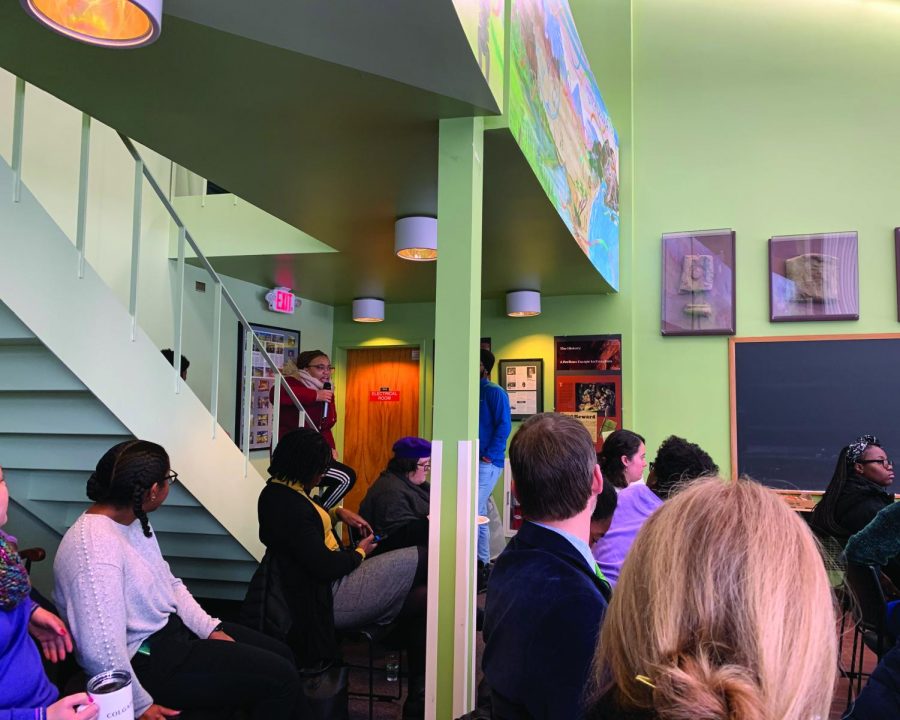ALST Hosts Brown Bag on Experiences of Students of Color
Africana and Latin American Studies (ALST) hosted a brown bag on Monday, January 27, during which Colgate University professors and students discussed the experience of students of color on the campuses of Predominantly White Institutions (PWI). Members of the Colgate community gathered in the ALANA Cultural Center for a panel, officially titled “Challenges for People of Color to Thrive in a Predominately White Institution from the Lens of Academia”. Moderated by senior Anthony Wright and featuring Associate Professor of English and Africana and John D. and Catherine T. MacArthur Chair Latin Amerian Studies Kezia Page and Kwasi Konadu, the brown bag was one of many events hosted by the University as part of a ten day celebration of Reverend Dr. Martin Luther King Jr.
Wright coordinated the event and guided the conversation to focus on two key topics: the professors’ opinions on the experience of being a Person of Color on college campuses, as well as their personal experiences at Colgate. He said that the professors were able to offer diverse points of view, which provided for an interesting take on certain issues.
“I think people appreciated hearing different angles of perspectives from the faculty. One of the faculty members described [that a] sense of belonging came from within. While the other faculty member expressed that external factors are critical for one’s sense of belonging,” Wright said.
The students who attended first discussed the concepts of barriers faced at PWIs and how they affect students at universities, particularly at Colgate. Konadu spoke from his experiences at Howard University, Cornell University and Colgate University.
“Distinguishing between groups marks a distinct group of people. This can sometimes be a self-sabotaging trap at universities,” Konadu said. “The question is not one of belonging, but rather of unresolved trauma and overcoming that trauma.”
Page elaborated on this topic and said that People of Color’s experiences cannot be understood by painting them with a broad stroke.
“I think the challenge of being a Person of Color at a Predominately White Institution is mediated in a lot of areas, like the classroom. But how you identify as a Person of Color will impact you differently. People who may be Asian will have a different experience than African Americans who will also have a different experience from people who are Black and from the Caribbean or Africa,” Page said. “Sometimes those different feelings come from yourself, or your identity, but sometimes stem from the institution.”
The conversation also touched on the concepts of stereotyping and athletics at a Division I school.
Konadu said that he believes Division I (DI) Athletics are part of systematic issues on campus.
“Being a student-athlete at a small university, which is DI, is a fraud… Colgate is a co-conspirator, they are part of the problem,” Konadu said. “DI compared to [Division III] and [Division III], when athletes who are looking at prospects in the NFL or NBA, and are trying to manage that with weight room, film session, practice and so on… [they] are sleeping in my classes; that is a crime against that student’s humanity. When they cannot go home on break and see their family, that is a crime against that student’s humanity. I am referring to the cartel that is the NCAA that trickles down and is affecting the life outcome of these students.”
Page spoke about another facet of Students of Colors’ lives at Colgate: navigating the social scene. She said that she is troubled by a shift in Students of Color’s social experiences.
“I was really impressed when I first got here that Students of Color were going in a different direction than the mainstream social life here. They would always tell me that the drinking culture is so dangerous. But now, they are part and participating in this,” Page said.
Both Konadu and Page offered advice to help students navigate their experiences on campus.
“Anyone who wants to connect with me outside the classroom, you are always welcome. I am a resource. You come and see me anytime,” Konadu said.
“If you are a student of color on this campus who is struggling, it is not wise to do that alone… There should be enough staff on this campus so that one person is not sort-of in charge of every student of color. If this institution is not giving you that type of support, then you should demand it” Professor Page.
Page offered a final remark to the students in the audience, eliciting a round of applause.
“You have to be so fine with who you are on your journey that you would have a problem if you lost [your identity]. If I lost it, I’d be lost,” Page said.
Wright said he was very happy to see the large crowd and to have audience members ask questions and participate in the discussion.
“We were so happy to see diverse students, faculty and staff attending this important event. All of the seats were taken, some people had to sit on the stairs or stand up. Everyone was engaged and listened closely to what Professor Page and Professor Konadu had to say,” Wright said. “Although it was an important topic, some humorous moments occurred and it made the conversation flow naturally.”
Following the conclusion of the conversation, many guests remained to speak with the professors and ask further follow up questions in smaller, focused dialogues.

Ethan Cherry is a senior from Baltimore, MD studying political science and architecture. He has previously served as multimedia manager, news editor, assistant...












